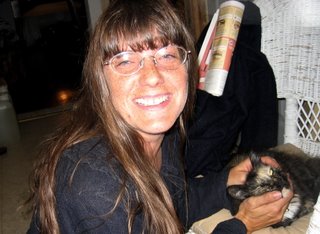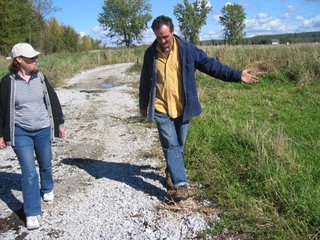 But they had a cook cooking fresh omlettes in the breakfast room - yum! Food was a problem in the US - we couldn't eat a lot of it. But at this hotel we had two good meals: the breakfast omlettes and the Duck Rolls. I asked to see the chef and congratulate him. He was chuffed. We ordered another round of the Chinese delight.
But they had a cook cooking fresh omlettes in the breakfast room - yum! Food was a problem in the US - we couldn't eat a lot of it. But at this hotel we had two good meals: the breakfast omlettes and the Duck Rolls. I asked to see the chef and congratulate him. He was chuffed. We ordered another round of the Chinese delight. Sitting nearby was a young woman reading a magazine and talking to her friend, one of the waitresses. She called out some facts about Global Warming, and our ears pricked up. It turns out she is reading the recent edition of The Economist we had been searching in all the newsagencies for since we were referred to it by Sue Capalbo, the team leader at the Big Sky Partnership, at Montana State U. She gave it to us. More coincidences, more spooky stuff. We gave her a kangaroo pin. She seemed impressed. Her name was Jessica and she is a prodigious reader.
Sitting nearby was a young woman reading a magazine and talking to her friend, one of the waitresses. She called out some facts about Global Warming, and our ears pricked up. It turns out she is reading the recent edition of The Economist we had been searching in all the newsagencies for since we were referred to it by Sue Capalbo, the team leader at the Big Sky Partnership, at Montana State U. She gave it to us. More coincidences, more spooky stuff. We gave her a kangaroo pin. She seemed impressed. Her name was Jessica and she is a prodigious reader. While in Albuqurque we spent a day with Peter Holter, the director of marketing with Holistic Management International, the organisation set up to promote the decision-making model invented by Allan Savory. It launched rotational grazing into popular consciousness. Peter took us in hand and showed us Old Town in Albuqurque and the rest of the city, especially the domestic building styles. The range towering over the city reminds me of Alice Springs. Peter is a fascinating fellow-refugee from the advertising business. We briefed Peter on the Carbon Coalition because Holistic Management is a basic carbon farming methodology, and we agreed to work together to creat opportunities for HM.
While in Albuqurque we spent a day with Peter Holter, the director of marketing with Holistic Management International, the organisation set up to promote the decision-making model invented by Allan Savory. It launched rotational grazing into popular consciousness. Peter took us in hand and showed us Old Town in Albuqurque and the rest of the city, especially the domestic building styles. The range towering over the city reminds me of Alice Springs. Peter is a fascinating fellow-refugee from the advertising business. We briefed Peter on the Carbon Coalition because Holistic Management is a basic carbon farming methodology, and we agreed to work together to creat opportunities for HM.We then took a 5 hour flight via Dallas and Philadelphia to Burlington, Vermont. Hired a car, and drove for an hour north to join Abe Collins and his friends to launch the first overseas chapter of the Carbon Coalition. This was the most personally rewarding part of the journey.
 Abe was the first overseas member - he is a share farmer (dairy) at Swanton, Vermont. I will blog the farm on the We loved the energy and passion of Abe and the grounded dynamism of his amazing partner Kailia. She is an artist. They have a We ate real food - fresh organic vegetables and home grown meat, all wonderfully prepared in stock that didn't come from a supermarket. Abe has the fire in the belly. He is widely-read and he has a head full of ideas. He exasperates his wife because he can become so engrossed in his ideas that he forgets her. Ie. he is a normal male. I left a copy of my book lying around and I think he had a look at it... Kailia is a youthful, unflappable, intense person. She could have been one of Joni Mitc
Abe was the first overseas member - he is a share farmer (dairy) at Swanton, Vermont. I will blog the farm on the We loved the energy and passion of Abe and the grounded dynamism of his amazing partner Kailia. She is an artist. They have a We ate real food - fresh organic vegetables and home grown meat, all wonderfully prepared in stock that didn't come from a supermarket. Abe has the fire in the belly. He is widely-read and he has a head full of ideas. He exasperates his wife because he can become so engrossed in his ideas that he forgets her. Ie. he is a normal male. I left a copy of my book lying around and I think he had a look at it... Kailia is a youthful, unflappable, intense person. She could have been one of Joni Mitc hell's Ladies of the Canyon, without the cliche West Coast cliches. Her achievements are all around her: Abe, daughter Margo, cat Apple, dog Cider.
hell's Ladies of the Canyon, without the cliche West Coast cliches. Her achievements are all around her: Abe, daughter Margo, cat Apple, dog Cider.Margo is amazingly articulate - she speaks at an adult level. Her genetic pool was a rich one. The do not have television. They read books. They make cider. The live a real life.
 We caught a glimpse of Vermont suburban culture when we attended a housewarming cocktail party at Kailia's parents' new home in Swanton. We met real estate agents and doctors and distribution agents and women who home school their children. Kailia's Father is a retired stockbroker. Her Mother is a beautiful woman.
We caught a glimpse of Vermont suburban culture when we attended a housewarming cocktail party at Kailia's parents' new home in Swanton. We met real estate agents and doctors and distribution agents and women who home school their children. Kailia's Father is a retired stockbroker. Her Mother is a beautiful woman.They love Opera and classical music. They have a wonderful view of Lake Champain where the American Navy defeated a British invasion force.
American plans for the War of 1812 included gaining control of Lake Champlain and the Great Lakes. Lieutenant Thomas Macdonough commanded the U.S. naval fleet on Lake Champlain. The two fleets finally met on September 11, 1814. (9/11) Macdonough positioned his fleet in a line with an anchoring
 system rigged with spring lines that allowed the vessels to be turned end-to-end to bring fresh guns on the opposite side of the ship to bear on the enemy should the guns on the original side become disabled. The two fleets were nearly matched in size and firepower. The battle raged for two and-a-half hours and many died. Thanks to their spring lines the American fleet ultimately defeated the Royal Navy, and the British army returned to Canada.
system rigged with spring lines that allowed the vessels to be turned end-to-end to bring fresh guns on the opposite side of the ship to bear on the enemy should the guns on the original side become disabled. The two fleets were nearly matched in size and firepower. The battle raged for two and-a-half hours and many died. Thanks to their spring lines the American fleet ultimately defeated the Royal Navy, and the British army returned to Canada.More to come....




No comments:
Post a Comment